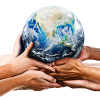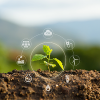The Sustainability Imperative
As organizations struggle to define a strategy that balances purpose and profit, opportunities are increasingly emerging to take the lead in sustainability initiatives. Front-line advances in areas such as net-zero emissions, AI-powered solutions for the underserved, precision agriculture, digital healthcare, and more are delivering business benefits, while simultaneously contributing to the realization of the UN’s 17 SDGs. We provide the expert thinking, debate, and guidance to help your organization reposition and transform in the era of sustainability.
Recently Published
This Advisor commemorates World Environment Day 2022 by looking at the potential impact of the climate crisis and identifying promising options to address the worsening environmental problem.
Cigdem Z. Gurgur describes how a blockchain-based Internet of Things (IoT) can push market systems toward sustainability. Blockchain offers new opportunities relevant to systems design. It connects stakeholders with multiple sources of verified information, generates a richer informational landscape for executing business processes, and enables secure transactions between untrusted actors. Trusted networks can reduce transaction costs, simplify processes, and reduce resource intensity compared to traditional transaction technologies. Gurgur explores the conditions needed to facilitate blockchain deployment in the next generation of supply chains, specifically through IoT technologies that have attractive applications for creating, monitoring, and enforcing sustainability standards.
Article
Greening Data Management for AI
Rohit Nishant and Thompson S.H. Teo discuss how to limit the negative impacts of artificial intelligence (AI) adoption by using concepts from both regenerative and doughnut economics. These two approaches seek to reconstruct economic systems so they operate within the sustainable operating limits of natural systems. Pointing out that AI adoption threatens to exceed sustainable boundaries by increasing aggregate demand for energy and new materials, Nishant and Teo put forth a 3Rs framework with which AI adopters can keep the impacts of AI within sustainable boundaries.
Corporate innovation often produces severe, unintended social consequences. Even as innovation creates value for a firm, it can destroy value within other systems. Here, the authors propose that companies move away from the traditional innovation model focused on the firm to a systems innovation model focused on the firm and its products in relation to other systems.
Kevin Brennan outlines how Lean and Six Sigma process management systems could be changed to redefine waste in ways that capture environmental impacts. These models historically seek to eliminate waste in production processes by defining it as anything that does not contribute to increasing customer value. Brennan argues that this customer-centric definition of waste should be broadened to recognize that a focus on customer value leads to practices that reduce environmental quality.
The authors discuss how concepts like circular economy, degrowth, and post-growth redefine which materials are considered waste and which are considered useful. Circular economy and degrowth approaches could provide stronger sustainability outcomes by rethinking what counts as waste in supply chain analyses, operations, and management. The authors look at supply chain subsystems that support strong sustainability outcomes, using practical examples. They show how strong sustainability can support societal and economic resilience and identify ways to overcome challenges to changing market systems.
Himanshu Shekhar suggests a framework of “aligning with macro and accomplishing in micro” for controlled and sustainable future growth. Many businesses operate on the assumption that resources like clean air, water, and predictable weather are freely provided by nature. However, the planetary boundaries framework vividly shows that natural systems are limited in their capacity to provide these natural resources and ecosystem services. The combined impact of business activity is exceeding the limits on many of these systems. Businesses must update their assumptions about what nature provides “for free” and act to address growing scarcity concerns.
Saeed Rahman, Natalie Slawinski, and Monika Winn examine how pioneering companies in agriculture, agri-food, and other sectors can build and leverage ecological knowledge (knowledge about the very ecosystems they rely on) to develop innovative practices that help regenerate social and natural systems. In doing so, these companies can reap benefits for their business and help turn our unsustainable agricultural systems into systems that sustain a growing human population without severely degrading or destroying ecological systems necessary for agriculture and other industries.


























